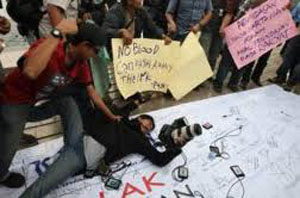
Warief Djajanto Basorie
JAKARTA: In America's Yosemite National Park, one major attraction is Half Dome. The tagline exhorts: "It's half rock and half gone!"
Indonesia's press freedom can also be measured by half. Bambang Harymurti, deputy chair of the independent Press Council, states the status of Indonesia's press is half free.
In the 2010 press freedom index of the Paris-based Reporters Without Borders, Indonesia ranks 117 out of 178 nations surveyed.
The ranking dropped significantly from 100 posted in the 2009 index. The young nation of Timor Leste fared far better at 93rd. In the top tier are Northern European nations.
Indonesia's 1999 Press Act allows press freedom. This means no more licences, no more censorship, no more bans common during the authoritarian rule of former president Soeharto.
Despite the state's commitment against interference, press freedom violations continue to occur. This gives Indonesia its lamentable ranking in the press freedom index. What is the cause?
The Press Council, in its year-end statement issued December 29, records 25 cases of violence against journalists and the media throughout 2010.
The violence took the form of intimidation, verbal abuse, damage to reporting equipment, pro-perty damage, prevention of co-verage, lock-ups, physical harm and murder.
The perpetrators are diverse: public officials, government office employees, artists, members of the public and thugs who may have been hired by disgruntled business people or state officials.
The Alliance of Independent Journalists (AJI Indonesia), counted 46 acts of violence against journalists in 2010, up from 37 in 2009. It cited one murder and three mysterious deaths.
The murder of Ridwan Salamun, a cameraman of the Jakarta-based Sun TV, has not been fully investigated by the police. Ridwan was hacked to death in Tual, Southeast Maluku, on August 21 while he was covering a clash between rival villages.
The cause of death of Alfret Mirulewan, chief editor of the Pelangi weekly in Kisar Island, Maluku, is inconclusive.
Alfret, who was investigating illegal fuel trading, was found dead on a beach on Dec. 17 three days after he went missing. An autopsy showed he was a victim of violence.
The circumstances surrounding the death of Adriansyah Matra on July 30 remain unresolved. The body of the Merauke TV reporter was found in a river near Merauke, Papua. He had been covering an illegal logging ring.
Muhammad Syaefullah was found dead July 27 at his home in Balikpapan, East Kalimantan, with froth around his mouth. Syaifullah, the local bureau chief of the highly regarded national daily Kompas, was known for his critical coverage of deforestation.
AJI notes that in only one act of violence in 2010 was the perpetrator brought to court.
An Army lieutenant went on trial for beating Rakyat Aceh daily reporter Ahmadi after Ahmadi filed a May 21 story linking the officer to an illegal logging scam in Simeulue, Aceh province.
Although the Ampatuan massacre of 32 journalists in the Philippines in November 2009 overshadows the deaths of the four Indonesian journalists, the impunity enjoyed by those responsible for violations of press freedom is common.
"While Thailand and the Philippines, together with Indonesia, are the region's strongest democracies, advocates have expressed concern over the trends of impunity, physical threats and legislative controls that could derail years of work to build a free and safe environment for the media to operate," the Southeast Asia Press Alliance, SEAPA, noted in a February 4 statement on Southeast Asia's press freedom challenges in 2011.
In Indonesia, other challenges to press freedom include the filtering of internet content decreed by Communications and Information Technology Minister Tifatul Sembiring.
The aim is to block online pornography, but the move could collaterally block out non-pornographic material.
Another challenge is a state secrecy bill drafted by the Defence Ministry.
The concern is that it could be at cross purposes with the 2008 Freedom of Information Act that came into force in April 2010.
Other issues are the Information Technology Criminal Offence Bill (RUU TIPITI), ostensibly to fight cybercrime, and an amendment to the Broadcasting Act that could further regulate the airwaves.
Given all these challenges, and more, the eminent rise of Indonesian journalism calls on reporters and editors to meet the obstacles head on.
"Journalists must be at the forefront to clear away the trepidations of the nation by providing factual, accurate, comprehensive and meaningful information. Journalists must meet the challenges of the times by having competence, including adherence to the journalism code of ethics," Jakob Oetama, founder and CEO of the Kompas Gramedia media combine, said before the National Press Day organising committee before they departed for Kupang, East Nusa Tenggara, to observe the annual event on Feb 9.
Warief Djajanto Basorie teaches journalism at the Dr Soetomo Press Institute (LPDS) in Jakarta.
- The Jakarta Post/Pacific Media Watch



